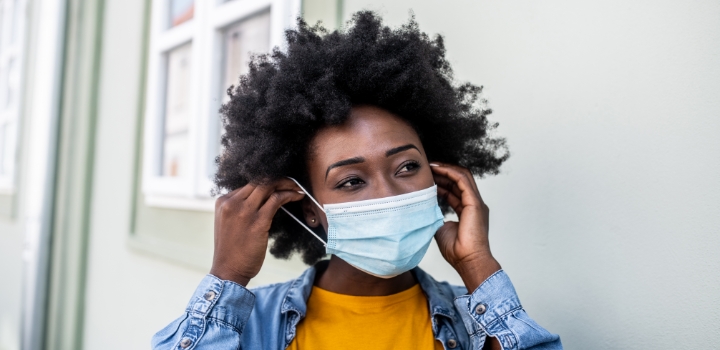Vaccines and variants - how do they affect each other?

Like all viruses, the virus that causes COVID-19 changes its genetic form - very slightly, but constantly. This mutation results in different variants emerging. Learn here how this happens, and what effects it has on how the COVID-19 vaccine works.
Sometimes, as a virus replicates (makes copies of) itself, it makes very small mistakes. The changes that come from these mistakes are called mutations. A virus with mutations is known as a variant.
What variants should we be concerned about?
The World Health Organization (WHO) lists variants into two main categories: variants of concern (VOC) and variants of interest (VOI). This is the difference between them:
- Variants of concern are the most serious. Compared to previous variants, they:
- Spread more easily, which means they spread faster, or
- Cause more severe illness, or
- Are more difficult to prevent or treat, or
- Are more resistant to existing vaccines.
- Variants of interest contain mutations which are linked to the problems of variants of concern. But those problems have not yet actually appeared. Scientists predict that they will cause the problems of easier spread, more severe illness, and more resistance to treatment and to vaccines - but they have not yet done so.
There are currently four variants of concern
So far, the WHO has identified four variants of concern. These are the variants which have affected us until now:
- Alpha variant: first found in the United Kingdom, September 2020.
- Beta variant: first found in South Africa, May 2020.
- Gamma variant: first found in Brazil, November 2020.
- Delta variant: first found in India, October 2020.
The Delta variant is reported to have fuelled the third wave of infections in South Africa, the rest of the African continent, Europe, Asia and North America. It spreads significantly and more rapidly than any of the others. In August 2021, the WHO said that the Delta variant was on the path to becoming the dominant variant worldwide. It is currently the dominant variant in South Africa.
Vaccines make variants less likely
- As we have seen, variants come from mutations that take place as the virus copies itself.
- So, if the virus continues to spread, then it will continue to make copies of itself - creating more opportunities for variants to emerge.
- That is why vaccines are so important: they reduce the number of people infected and so reduce the spread of infection and the possibility of variants emerging.
Vaccines are effective against variants
There are currently two vaccines that are widely used against COVID-19 in South Africa: Pfizer-BioNTech and Johnson & Johnson. These vaccines have been proved to be effective against the dominant Delta variant. COVID-19 vaccination, in general, reduces the risk of COVID-19 and its potentially severe complications.
Is population immunity possible?
"Population immunity" is also called "herd immunity", "community immunity" or, as some scientists have recently preferred, "population effective protection." All these terms describe a situation in which enough of the population is immune to a disease in order to make its spread unlikely, whether that immunity comes through having had the disease, or through vaccination, or through both.
In South Africa, herd immunity was expected to be achieved when 67% of the population was vaccinated. However, the emergence of highly transmissible variants like the Delta variant pushed that number closer to 90%. Important questions around whether vaccinated people can transmit the virus if infected, and how long vaccine immunity lasts, have also added to the complexity of reaching herd immunity.
This may mean that we have to change our goal and accept that COVID-19 will become an enduring aspect of our world - in other words, it will become 'endemic.' In this situation, vaccines would make serious illness very unlikely, but the virus may continue to spread in communities, without causing devastation.
Either way, vaccination is vital
So, whether we are aiming for population immunity or accepting that COVID-19 will be endemic, vaccination is crucial. Without vaccines we will not reach either of those two goals. Vaccination remains the safest way to achieving immunity that offers protection severe illness and death.
Learn more about variants, population immunity and endemic COVID-19. Join the millions of South Africans who can proudly say, #IGotMyVaccine.
All medical information found on this website including content, graphics and images, is for education and information objectives only. Discovery publishes content to help to promote a better understand of COVID-19 and COVID-19 vaccinations. The content covered is an overview of key concepts and is not exhaustive in nature. We encourage further reading from other credible sources where necessary.
South African organisations:
- National Department of Health's dedicated COVID-19 portal: https://sacoronavirus.co.za/
- National Institute for Communicable Diseases' (part of the National Health Laboratory Service) dedicated COVID-19 hub
- South African Health Products Regulatory Authority (SAPRHA - part of the National Department of Health).
- South African Medical Research Council (SAMRC)
- South African Medical Journal (SAMJ)
International Organisations:
- Johns Hopkins University
- Harvard Health, Harvard University COVID-19 resource center
- Mayo Clinic COVID-19 resource center
- New England Journal of Medicine (NEMJ)
- US Centers for Disease Control and Prevention (US CDC)
- US Food and Drug Administration (US FDA)
- World Health Organization (WHO)